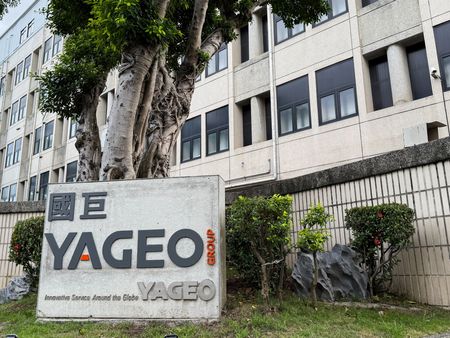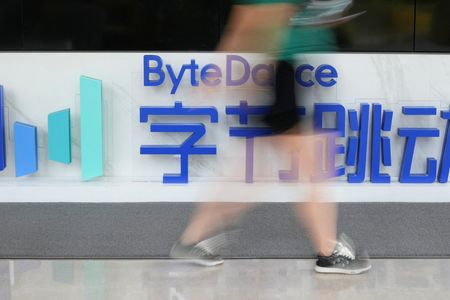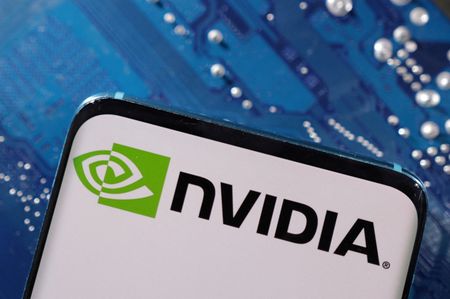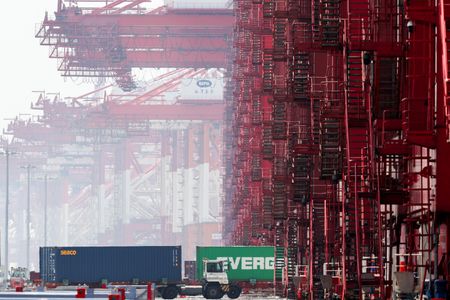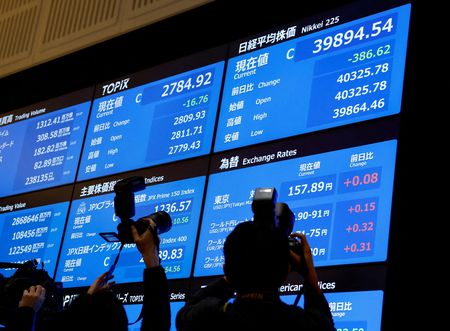By Stephen Nellis, Max A. Cherney and Arsheeya Bajwa
(Reuters) -Nvidia forecast third-quarter revenue above market estimates on Wednesday, helped by robust demand for its AI chips, but shares fell as its on-hold China business remained uncertain.
The AI market bellwether expects revenue of $54 billion, plus or minus 2%, in the third quarter, compared with analysts’ average estimate of $53.14 billion, according to data compiled by LSEG. But its fiscal second-quarter results came up short of some analyst expectations in its important data center segment, with some analysts suggesting cloud computing providers may be more cautious about spending.
Nvidia also said it has not assumed any shipments of its H20 chips to China in its outlook. The U.S. government said it wants to take a 15% commission on sales of such chips to China, but has not yet published a rule codifying the fees.
Shares of Nvidia dipped about 2.6% in extended trading after its quarterly revenue beat analysts’ estimates but failed to impress investors who have become accustomed to blowout reports from the AI chip heavyweight. The stock dip clipped about $110 billion from Nvidia’s $4.4 trillion market cap – an amount greater than the entire market cap of rival Intel.
Nvidia has been caught in the crossfire of the trade war between Washington and Beijing, as the world’s two largest economies claw for dominance of generative AI technology.
Nvidia’s forecast “doesn’t appear to include China in the guide, so while the guide came in a bit softer than expectations, there is definitely upside should they be able to take sales to China next quarter. That is a big question mark to watch,” said Ben Bajarin, CEO of technology consulting firm Creative Strategies.
Still, demand has surged for Nvidia’s advanced chips that can speedily process the large amounts of data used by generative AI applications as businesses race each other to dominate the new technology.
Chief Financial Officer Colette Kress said the company’s “sovereign AI” efforts – a push to sell AI chips and software to governments around the world – are on track to generate $20 billion in revenue this year. Kress also said AI efforts could generate $3 trillion to $4 trillion in infrastructure spending by the end of the decade, with $600 billion of that happening so far this year alone.
Big Tech companies including Meta Platforms and Microsoft have been spending liberally to support their AI ambitions, and Nvidia is the biggest beneficiary, with a significant chunk of this spending funneled toward its chips.
The company said that about half of its $41 billion in data center revenue came from large cloud service providers during the latest quarter. That was slightly below estimates of $41.42 billion, according to data from Visible Alpha.
“The data center results, while massive, showed hints that hyperscaler spending could tighten at the margins if near-term returns from AI applications remain difficult to quantify,” said eMarketer analyst Jacob Bourne.
Enthusiasm for AI stocks, centered around Nvidia as Wall Street engaged in picks-and-shovels trading, has been the dominating force behind the rally of the S&P 500 Index over the last two years.
“This is the smallest reaction to an earnings report in Nvidia’s AI incarnation,” said Jake Behan, head of capital markets at Direxion in New York. “While it may not have been a blowout, it’s not a miss.”
In an unprecedented deal with U.S. President Donald Trump, Nvidia has agreed to pay the government 15% of some of its revenue in China in exchange for a reversal of restrictions that curbed sales of its H20 chips to China. But Beijing has cautioned domestic companies about imports and sources said that Nvidia has halted production of H20 chips.
Nvidia had in May expected the curbs to shave off $8 billion in sales from the July quarter. The company reported revenue of $46.74 billion for the second quarter, beating estimates of $46.06 billion.
However, there does appear to be demand for Nvidia’s H20 outside of China. Kress said during the analyst call that a single customer outside of China bought $650 million worth of the chips during the second quarter.
Nvidia also said it had authorized an additional $60 billion in share repurchases.
(Reporting by Arsheeya Bajwa in Bengaluru; Max A. Cherney and Stephen Nellis in San Francisco and Suzanne McGee Providence, Rhode Island; Editing by Maju Samuel, Sayantani Ghosh and Matthew Lewis)



